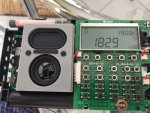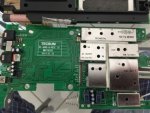sven - Although I only owned it once, I regret having to get rid of my 800 since it was one of the ones that wasn't beset with manufacturing problems. Airband was a real treat since it didn't use the wide filter, and the audio response was about as good as being in the tower itself. I just cry when engineers put all that work into something on paper, and the qc / manufacturing floor lets us down with those units that had problems. I think about how disappointed the engineers must have been too, since it really wasn't their fault.
iMonitor - I think you've discovered that NO dsp-based receivers in this price class are good for ssb. I haven't tried them all, but I have had all 3 listed above. While "good" is relative, I can't stand them for one reason:
The agc, be it rf / if / or af, is absolutely horrid, because while yes, they can incorporate ssb reception into a broadcast receiver, the dsp engineers just don't understand how utility or amateur comms need an agc designed with the proper attack and decay for intermittent transmissions from a station or stations that emanate from different locations and strengths. They only seem to be familiar with steady-state broadcasts, and might pile on fine tuning, but tossing the baby with the bathwater by not incorporating the right agc. I suppose the main purchasing demographic is for ECSB usage, but I digress....
So most utility / amateur ops just blast the first syllable or two - nevermind even the blast of the first dit or dah of cw! Uncomfortable to listen to, unless you only listen to weak signals, or attenuate the heck out of it - which I found to be an unacceptable standard operating procedure of the Grundig 750 (albeit the 750 using an all-in-one analog boombox am/fm chip) with ssb hacked in. What a let-down from the properly designed 800!
It the dsp manufacturers in the portable classes just put in a *little* thought to agc attack and decay appropriate to intermittent transmissions, ie fast-attack and slow-decay, it would go a long way.
Heh, my 2C...




